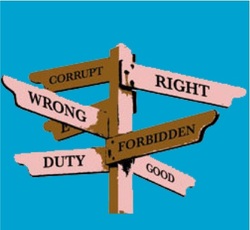 Genealogy of Morality and Moral Codes (Homayoun Shahri, PhD, MA, LMFT) Morality is defined as a set of principles and system of values concerning what is “right” and what is “wrong”. We can all appreciate that morality changes from society to society, historical era to historical era, etc. Thus we have morality of the 19th century vs that of the 20th century, and we have the Christian morality vs Islamic morality, and for example morality in Saudi Arabia vs morality in Sweden. They are all different. Thus to take morality as the way it relates to existing code of conduct, may negate the existence of a universal code of conduct and morality. The 18th century German philosopher Emmanuel Kant attempted to answer the question of universal morality by describing what he called “categorical imperatives” which were a set of principles and values that Kant believed were universally applicable as moral codes of conduct. However, since text can only refer to text (in postmodern deconstructionist thinking of Derrida), Kant's categorical imperatives cannot refer to anything absolute and immutable as he and modern thinkers believed, as text is subject to interpretation. Aside from Kantian ethics and morality specified in categorical imperatives, moral codes were designed to insure and preserve the current socioeconomic system both at a micro level (within the family and the individual) as well as a macro level (within the society). Thus the moral codes are designed to reproduce the current and dominant relational transactions within the socioeconomic system and preserve the power hierarchies. The individual members of the society are then relegated to a position in which there is no need to take responsibility for their own behaviors and actions, as long as the moral codes (some of which are enforced by laws) are followed. This is Nietzsche's point in the statement: “Morality is herd-instinct in individual”. He divided the society into the supermen (Ubermensch) and the “herd” who follow them. The supermen have transcended good and evil, and are beyond moral codes. They define the moral codes based on their own belief system and to keep the herd in check to reduce their anxieties (related to taking responsibility for their lives). And for the “herd”, as the moral codes weaken, chaos (within behavior) ensues, as evident in this era of human existence. Wilhelm Reich introduced the term “Natural Morality”. He believed that human organism, if not split from its unitary function (mind-body, thinking-feeling, etc), is self regulating. Natural morality will then be the set of all actions and system of values that support self regulatory function of the human organism. These natural codes increase aliveness and motility, promote life in general (of all sentient beings on the planet), increase pleasure and reduce pain, etc. Reich believed that a successful therapy should end when the patient has achieved self regulation and can decide for himself what is right and what is wrong without needing the herd based moral codes of the society. Natural morality may also be deconstructed were it not for its connection to the bodily feelings, which are not text and do not refer to text, and thus are not subject to interpretation. Feelings defy definition but we all have a felt sense of what they are. If one reads the works of famous anthropologists like Margaret Mead or Branislaw Malinowski, which indicate that violence and destructiveness may not be innate in human animal but may be related to patriarchal that authoritarian upbringing, in which all natural and healthy instinct of the child is repressed. Violence simply did not exist (in the same way as today) in matriarchal societies. There was thus no need for introduction of moral codes. Perhaps we should strive toward building a modern version of matriarchal societies which will necessarily be egalitarian, and power hierarchies will not exist. Authority will be based on knowledge and not power. Wealth will be based on one's happiness and ability to enjoy life and not monetary wealth. Am I a Utopian? I don't believe so. This, in primitive form, did exist once during the brief presence of our species on the planet, that gives me hope ... But in the mean time the question is what is to be done, so that we can enjoy our lives but also strive in this direction. This comes from my humanism and love of humanity despite its flaws and destructive behavior. Perhaps all that can be done is to pass the word along, hoping that more and more people can hear. The only hope may be with children, as most of our adults are beyond help and their "core" cannot be reached. In other words they are far gone. But perhaps a generation of healthy children can reverse the destructive trend. Although, looking at today's children, I am not hopeful at all, as their aliveness is even less that our generation!!! This is one of the reasons why I left the field of engineering and entered the field of psychotherapy, despite major financial impact. Comments are closed.
|
AuthorHomayoun Shahri Archives
May 2016
Categories
All
|
Ravonkavi Privacy Policy
©2018 Ravonkavi
©2018 Ravonkavi

 RSS Feed
RSS Feed